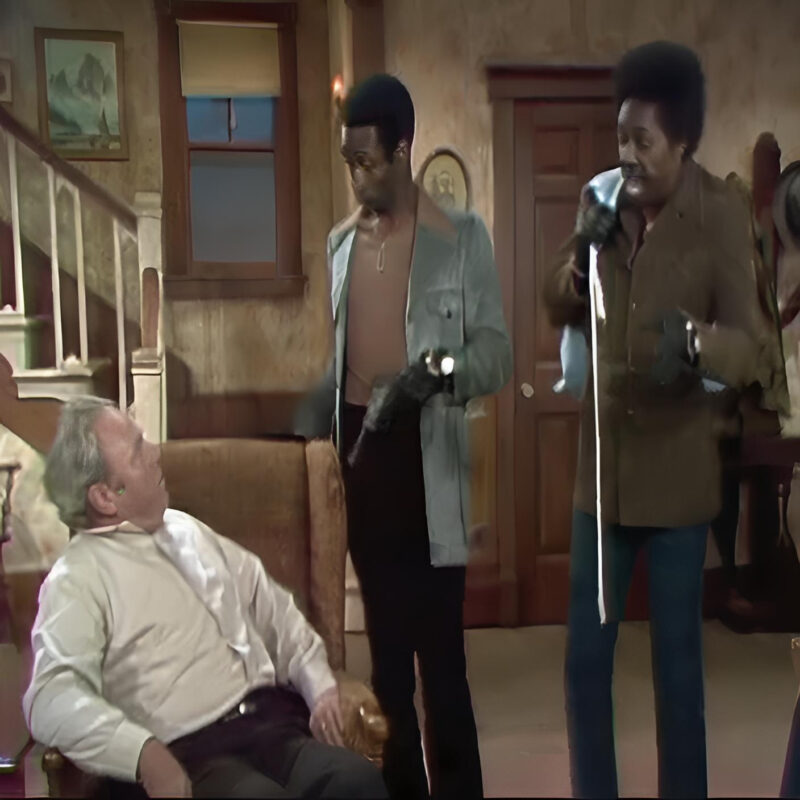
When you watch All in the Family, you might notice a credit stating the show was based on the British series Till Death Us Do Part, which ran from 1965 to 1975. This British sitcom was as controversial in its time as its American counterpart would become.
To understand the similarities between Till Death Us Do Part and All in the Family, and how closely Carroll O’Connor’s Archie Bunker resembles Warren Mitchell’s Alf Garnett, consider a 1968 article from the Chicago Tribune: “The plot revolved around the four members of the Garnett family. Most of the action took place in their dumpy, working-class English house. Ruling over the household with bull arrogance was Alf, a bald, squinty-eyed Cockney whose arguments grew coarser and lousier as his facts became wilder. Mrs. Garnett, meanwhile, emerged from a stupor only to exult over her husband’s misfortunes. Their mini-skirted daughter existed only in a sort of mindless sexuality. Paired for combat with Alf, usually in a battle of political catch-phrases, was his son-in-law, Mike. His main character trait was a cocky, with-it superiority. In this family completely devoid of love, any casual remark could set off the most hateful arguments, where victory was to be achieved by crushing personal insult.”
While there are some differences, the Garnetts and the Bunkers share more similarities than not. Both shows were shocking to their audiences and enormously popular. Like Archie Bunker, Alf Garnett was unlike any character previously seen on television.
In 1967, the Fort Worth Star-Telegram reviewed Till Death Us Do Part: “Every Monday night, this Everyslob outrages his television audience. Before anyone gets his dander up, it should be pointed out that this ‘comedy’ is not on American television.” They compared Alf Garnett to a character in a New Yorker cartoon, noting, “But to hear Alf spouting his four-letter words, knowing that he is shocking the leaves off the tea set, is to love him.”
Milton Shuman, TV critic for London’s Evening Standard, added, “The image may have been distorted, but in watching Till Death Us Do Part, Englishmen were looking at themselves wallowing in the hates and fears and prejudices most of us tucked away in some genteel niche of our psyche.”
Johnny Speight, the creator of Till Death Us Do Part, echoed sentiments that Norman Lear would later express about Archie Bunker. In a 1968 interview with The Age of Melbourne, Australia, Speight said, “I didn’t basically create Garnett. He was already there. He was created by a vile society. I wrote this thing knowing Garnett is true of people in this country. I meet Garnetts in my local pub and although they talk in a posh accent, a lot of them aren’t much brighter than Garnett. All Enock Powell [a Conservative Member of British Parliament] has done is prove my point: the country’s full of Alf Garnetts. But I never wrote to change them. I was pointing out that this character existed. I wanted people to laugh at him. If they can’t laugh, it’s not my fault.”
By 1968, Till Death Us Do Part had caught the attention of Norman Lear and Bud Yorkin. They attempted to create two American pilots based on the show for ABC, but the network decided not to proceed. Undeterred, Lear and Yorkin planned a movie version, transforming the Garnetts into the Bunkers and moving the setting from Britain to Brooklyn, New York. The Ottawa Journal described the film as “underscoring the generation gap concerning a bigoted mother and father and their two liberal children.”
Lear reflected on the original series, saying, “Just about every subject in the book, including sex, race, and religion, was treated with frankness rarely seen on the tube.” This frankness found a new home on American television in January 1971, when CBS aired the first episode of All in the Family, based on Till Death Us Do Part. The rest, as they say, is history.
